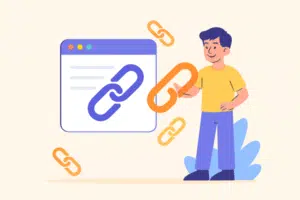The Importance of Backlinks in Search Engine Optimization SEO
What Are Backlinks?
Backlinks, also known as “inbound links”, are links from one website that point to another. In simpler terms, they occur when one website creates a hyperlink that directs users to content on another site.

Backlinks are a fundamental element of SEO (Search Engine Optimization). They help boost a website’s credibility and improve its ranking in search engine results pages (SERPs), such as those of Google.
It is crucial to differentiate between backlinks and regular internal or external links. Backlinks often originate from well-established, high-authority websites that are considered trustworthy sources of information.
In contrast, standard links may either be internal (within the same website) or come from unreliable sources, and they usually do not carry the same level of SEO weight. High-quality backlinks signal the importance and value of the content, increasing the chances of ranking higher in search engine results.
There are several types of backlinks. The most notable include:
- Natural backlinks: earned organically due to the quality of the content.
- Reciprocal backlinks: where two or more websites agree to link to each other.
- Directory or citation links: which are generated from business listings or resource directories.
Each type has a different impact on SEO, but backlinks from reputable, high-authority websites are especially valuable. These links can significantly increase site traffic and indicate to search engines that the content is relevant and trustworthy.
How Backlinks Affect SEO
Backlinks are a core ranking factor in SEO, playing a key role in determining a website’s position in search engine results. When one website links to another, it’s essentially vouching for the linked content—signaling that the content is worth visiting.
This boosts the credibility of the receiving website and helps improve its rankings. Search engines evaluate backlinks using several criteria, mainly quality and quantity.
- Quality is a major factor: backlinks from reputable, authoritative websites carry more SEO value.
For example, if a site receives a backlink from a well-known and high-quality site, it enhances its credibility and ranking potential. - On the other hand, low-quality backlinks (from spammy or irrelevant sites) can hurt a website’s ranking and reputation.
Therefore, focusing on acquiring backlinks from trusted, authoritative sources is a powerful SEO strategy.
- Quantity also matters, but only if the backlinks are relevant and earned naturally.
A large number of high-quality backlinks increases the likelihood of ranking well on search engines.
Thus, investing in building diverse, relevant, and credible backlinks is essential for improving online visibility.
In conclusion, backlinks are a vital part of any SEO strategy. Building the right mix of high-quality and well-targeted backlinks improves a site’s authority and ranking performance on search engines.

Effective Strategies for Building Backlinks
Backlinks are critical for SEO, as they reflect a site’s trustworthiness and importance. To build a strong backlink profile, several proven strategies can be used:
-
Create High-Quality, Engaging Content
Compelling, valuable content naturally attracts backlinks. When content resonates with the audience, people are more likely to share it and reference it. This organic backlinking is among the most sustainable methods. Make sure your content adds unique value and is rich in insights to boost shareability.
-
Guest Blogging
Writing guest posts for reputable websites in your niche is a strategic way to earn backlinks. Choose blogs that align with your brand and have strong credibility. By delivering relevant and engaging content, you not only gain backlinks but also expand your reach to new audiences.
-
Link Exchange (Carefully)
Partnering with high-ranking websites or complementary brands for link exchanges can work—as long as it’s done ethically and naturally. Choose partners whose content is relevant and of high quality to avoid penalties.
-
Avoid Black-Hat Techniques
Buying links or using manipulative tactics can lead to Google penalties, which severely damage a website’s SEO standing. Always avoid unethical methods such as link farms or fake link networks.
In the long term, backlink building requires patience and consistency, but it pays off with long-lasting SEO benefits.
Challenges and Considerations When Working With Backlinks
While backlinks are essential to SEO, they come with challenges and risks that require careful handling.
- Not all backlinks are beneficial: Links from untrustworthy or low-quality sites can negatively impact your rankings.
- Manipulative backlinks, such as paid links or those that violate Google’s guidelines, can trigger manual actions or penalties.
Search engines are sophisticated and can detect unnatural linking patterns, such as buying links or participating in link schemes. These actions often result in ranking penalties or delisting.
To mitigate these risks, website owners and marketers should:
- Focus on quality over quantity: Build relationships with relevant, high-authority websites.
- Maintain ethical practices: This includes producing shareable content and using content marketing techniques to build visibility and backlinks naturally.
Backlink strategies must align with ethical SEO standards, focusing on long-term gains rather than quick fixes.
Ultimately, to overcome the challenges and maximize results, it’s essential to design a backlink strategy that is ethical, scalable, and sustainable over the long run.








Such a smart focus! Data analysis takes the guesswork out and helps websites perform at their very best.